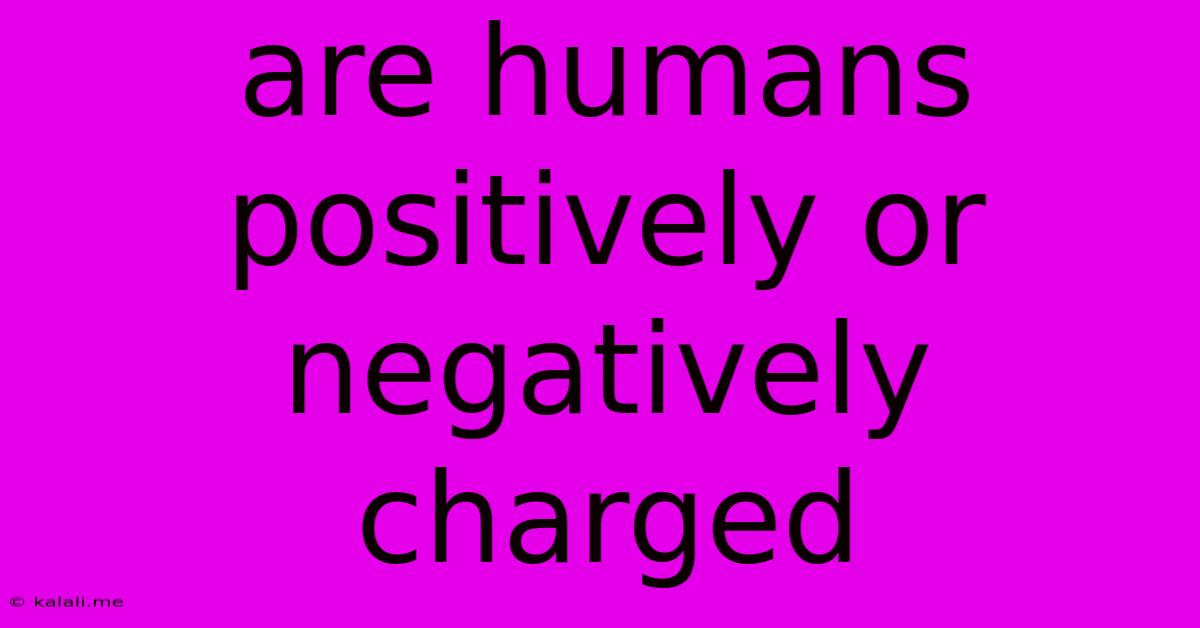Are Humans Positively Or Negatively Charged
Kalali
Jun 03, 2025 · 3 min read

Table of Contents
Are Humans Positively or Negatively Charged? The Complex Answer
Meta Description: Humans aren't simply positively or negatively charged; our bodies are incredibly complex electrochemical systems with both positive and negative charges playing crucial roles. This article delves into the intricacies of human bioelectricity.
The question of whether humans are positively or negatively charged isn't as straightforward as a simple "yes" or "no." While we might associate electricity with positive and negative poles, the human body operates on a far more nuanced electrochemical system. We're not uniformly charged; instead, we possess a complex interplay of positive and negative charges at the cellular and molecular level, essential for life itself.
Understanding Bioelectricity: The Foundation of Life
The fundamental unit of this electrochemical system is the cell. Each cell maintains an electrical potential difference across its membrane – a difference in electrical charge between the inside and the outside. This is achieved through the selective movement of ions, particularly sodium (Na+), potassium (K+), chloride (Cl-), and calcium (Ca2+), across the cell membrane. This process, crucial for nerve impulse transmission, muscle contraction, and numerous other biological functions, involves both positive and negative ions.
Think of the sodium-potassium pump, a vital protein complex embedded in the cell membrane. This pump actively transports sodium ions out of the cell and potassium ions into the cell, creating an electrochemical gradient. This gradient is essential for the generation of action potentials – the electrical signals that allow our nervous system to function.
The Role of Ions in Human Physiology
Different ions carry different charges. For instance, sodium and potassium ions are positively charged (cations), while chloride ions are negatively charged (anions). The precise balance and movement of these ions across cellular membranes are critical for maintaining cellular function and overall health. Disruptions to this balance can lead to a variety of health problems, from muscle cramps to cardiac arrhythmias.
Furthermore, the human body uses these ionic charges to conduct electricity. This bioelectricity is responsible for a wide range of processes including:
- Nerve impulse transmission: The rapid transmission of signals throughout the nervous system relies on the movement of ions across nerve cell membranes.
- Muscle contraction: Muscle cells contract in response to electrical signals generated by the movement of ions.
- Heartbeat regulation: The rhythmic beating of the heart is controlled by electrical signals generated and propagated throughout the cardiac muscle.
- Sensory perception: Our ability to perceive the world around us, through senses like touch, sight, and hearing, also involves electrochemical processes.
The Net Charge: A Misleading Simplification
While individual cells and molecules within the human body possess both positive and negative charges, attempting to assign a single net charge to the entire human body is largely meaningless. The charges are highly localized and dynamic, constantly shifting in response to various biological processes. Any overall charge would be effectively neutralized by the surrounding environment.
Beyond the Basics: Electroencephalography (EEG) and Electromyography (EMG)
Techniques like electroencephalography (EEG) and electromyography (EMG) measure the electrical activity of the brain and muscles respectively. These measurements don't indicate a net positive or negative charge of the body but rather the differences in electrical potential across various tissues.
In conclusion, the question of whether humans are positively or negatively charged is oversimplified. The human body is a marvel of electrochemical engineering, relying on the intricate interplay of positive and negative charges at the cellular and molecular levels to maintain life and function. Focusing on the complex dynamic of ion movement and its impact on various biological processes paints a much clearer picture than attempting to assign a single overall charge.
Latest Posts
Latest Posts
-
Is Aloe Plant Toxic To Cats
Jun 05, 2025
-
What Is The Pattern On Bicycle Playing Cards Called
Jun 05, 2025
-
Fallout 4 Where Is Dogmeat In Sanctuary
Jun 05, 2025
-
Sql Server Auto Add Recommeded Index
Jun 05, 2025
-
Clog In Kitchen Sink With Garbage Disposal
Jun 05, 2025
Related Post
Thank you for visiting our website which covers about Are Humans Positively Or Negatively Charged . We hope the information provided has been useful to you. Feel free to contact us if you have any questions or need further assistance. See you next time and don't miss to bookmark.